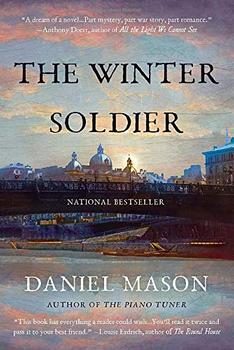Summary | Excerpt | Reading Guide | Discuss | Reviews | Beyond the Book | Readalikes | Genres & Themes | Author Bio

Following his performance, some of the other students approached him and asked him to join their groups. But he had no time for their inadequacies. He couldn't understand the laziness of those who hired artists to help them remember the anatomy of their cadavers. He was ready to move on, to touch his patients, to cut them open and take out their disease. Even the clinics frustrated him—crowds of eighty would follow their renowned instructor, and merely ten or twenty of them would be allowed to probe a hernia or examine a tumor in a breast. Once, and only once, he was left alone with a patient, a wispy-haired Dalmatian from whose ear canals he extracted enough wax to make a small but working votive candle. The man, who had been diagnosed as deaf for fifteen years, stared at Lucius as if Christ himself had just returned. But the praise, the blessings, the lachrymose kissing of Lucius's hand embarrassed him. This was what he had trained for? Mining? That his esteemed professor had attributed the deafness to dementia only left him more depressed.
He returned to his books.
By then, only Feuermann could keep up with him. Soon they left the others and studied alone, pushing each other to ever finer diagnostic feats. They memorized poisoning syndromes, the manifestations of obscure tropical parasites, and mischievously applied defunct physical classification systems (phrenology, humoralism) to the other members of their class. When Feuermann said that he could diagnose a dozen conditions by watching a patient's gait, Lucius countered that he could do so by listening to the gait, and so the two sought out an empty corridor, and Lucius turned to face the wall. Feuermann walked back and forth behind him. Slap went his feet, and slap slap and slide-thump and slide-slide and plop plop. The answers were: sensory ataxia, spastic hemiplegia, Parkinson's, and fallen arches.
"And this?" asked Feuermann, and his feet went pitter-pitter plop.
But that was easy.
"Dancing, wretched type, chronic, most likely terminal."
"I have been defeated!" roared Feuermann, as Lucius, utterly pleased with himself, began to tap as well.
He felt at times that Feuermann was the only person who could understand him, and around Feuermann alone, he felt at ease. It was his friend, handsome, already with a bit of a reputation for flirtation among the lay nurses, who persuaded him to go to the brothel on Alserstrasse by arguing that it had once been frequented by the legendary doctors Billroth and Rokitansky; Feuermann, who taught him, with reference to Structure and Function of the Genitalia of the Female (Leipzig, 1824), the principle of titillatio clitoridis. And yet never in the past two years had they spoken of anything that wasn't at least partially related to medicine. Not once had Feuermann accepted an invitation to Lucius's palatial home on Cranachgasse. And Lucius never asked what had happened to Feuermann's parents that led them to flee their village near the Russian border when his friend was still a baby, or why he had no mother. He knew only that his father was a tailor, outfitting his son with suits assembled impeccably from scrap.
Billroth, said Feuermann, would dine on gherkins after coitus; Rokitansky never took his lab coat off. Titillatio had once been prescribed by the great van Swieten to treat the frigidity of Empress Maria Theresa; it was what saved the Empire. Once, from nowhere, Feuermann said, "Perhaps one day we might marry sisters." Lucius said he thought this was a fine idea and asked if he had read Klamm's paper on bromides for palpitations of unknown cause.
Excerpted from The Winter Soldier by Daniel Mason. Copyright © 2018 by Daniel Mason. Excerpted by permission of Little Brown & Company. All rights reserved. No part of this excerpt may be reproduced or reprinted without permission in writing from the publisher.
Your guide toexceptional books
BookBrowse seeks out and recommends the best in contemporary fiction and nonfiction—books that not only engage and entertain but also deepen our understanding of ourselves and the world around us.